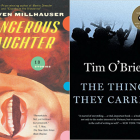A Discussion about the word “Random,” Part II

I have, for at least the past year, been mildly to massively frustrated by the rise of the word “random” as it’s presently used. This is dull in all sorts of ways—every writer’s got his/her words which frustrate, to say nothing of the nebbishness of even bothering to be pissed at some utterance—but I haven’t been able to let go of the urge to get into why the word is toxic to art. Fortunately, I can ask Bob Hicok questions, and he and I started talking about the word in the summer of 2010, amassing an almost silly amount of words on the topic. We then started again, in November, and (I) tried to be more articulate about the specifics of the word. What follows is the second of two long back-and-forths conducted over email about the word and its attendant dangers to art, specifically poetry. To read Part I, see here.
Cutter: What’s weird about this is the judgment—which may be why I got pissed about the word to begin with. For those of us trying to make shaky home among the open/unknowing instead of the fixed, the random leveled feels like judgment not just of the utterance but of the whole attempt at play: the word itself feels like the utterance spoken by the stick up someone’s ass. The Tab A/Slot B thing? Certainly there’s little of that work being asked for; and even if one can get someone to insert B to A, there’s less and less chance to make anyone but the most dedicated player Insert Tab A into Slot The Wind, or to Bend Object C into The Shape of Your Face’s Reveal, Etc.
Does random rankle so much because it’s fundamentally opposed to growth and childishness? That’s what I don’t get: there’s a good wetness to have on/in/among all moving things, and random seems against that—the fixity you’re talking about. This goes to that review you mentioned: that the commentary focused on the direction the poems were pushing, and what they were doing, without any inquisition of the aesthetic involved in that. I think I get that.
What’s interesting about all this for me is where you’re at, and how you’ve embraced a level of fearlessness. Any writer who’s had some measure of success has suffered the however-long complex of trying to repeat him/herself, trying to again make whatever first made success. You seem not to (or maybe you have, and you’re just repeating yourself in clever enough ways for notice to be evaded, but I don’t think so). Some of this gets specifically at what *you*, Bob Hicok, do: you seem willing to keep flexible, stay loose, willing to follow impulse’s whisper wherever it needs to go—but 1) you’ve got a ton of experience/practice at that, and 2) you’ve had enough success now to be able to risk failing (however that gets defined). I wonder, I guess, whether random—and the fear/insecurity that word/criticism automatically invokes—is a level-of-success/comfort thing, you know? I don’t know how many over-30 folks use that word.
Still, my anxiety about the word is exactly that it’s used most by younger folks, which means their relationship to the strange/weird/un(der)known, to the thing which makes non-logical/non-overt sense, is to shunt away, dismiss, be afraid of. We’ve gotten into that before so I won’t go. But/plus/also/more: if one’s got Random in his/her arsenal as judgment device, isn’t that mutually exclusive to the flex and give art’s (and true learning, but whatever) asking of everybody?
Hicok: I think so. Existence is better if you’re curious, if your impulse is to step into, rather than away from, to embrace, rather than shun. Consciousness is active, alive. One of the things I look for in people is how much interest they show in things they know nothing about. And you’re right: kids have this. Why is the sky blue; where did our dog go when she died? Maybe it’s because they’re experiencing the brainfire of youth, of their physical maturation, but they so directly engage the void, in a manner we might call fearless, but seems more aptly described as natural. I see the same thing in our cats. Take an object that’s been out in the open, a pencil, perhaps, something they’ve shown no interest in, put it under a piece of paper and they’re enthralled. To the extent that the use of the word random is a symptom of cognitive malaise, it scares me too, precisely because it of the death of curiosity, without which play and genuine consciousness is impossible. And as you wrote, the word can make you feel like it’s not just the poem or statement that’s being rejected, but the idea or possibility of mindfulness itself.
As far as the review, it wasn’t that I expected the reviewer to completely contextualize his statement. But imagine if, in praise of a book of narrative poems, I wrote that the poems moved from plot-point to plot-point fluidly, without then connecting that statement to any larger perspective about why I’m bothering to tell you this. Description, if unconnected to larger ideas, will seem to be those larger ideas and pass as the deeper thinking about the thing, when it is merely description. The apples were red. Great. What does that tell me? In this case, what does it tell me that the sentences in poems are sequentially disruptive of meaning? And more importantly, since this kind of disruption is something people have worked with for a very long time (I just read some prose poems by Max Jacobs that would be easy to place in lit mags now, and you could throw a stone even farther back and have it land in a field of non sequiturs), and since the usual claim is that a broken text mirrors how consciousness works, I would have loved the reviewer to step even a little toward considering the presumptions behind this practice, and ask, say, if consciousness is multifaceted enough that it requires a range of styles to even begin to reflect its dimensions. I would love a poetics of OK, what now?
Without that kind of probing, consciousness becomes static, and from my perspective, is no longer functional, no longer generative. Just as, if you meet the weird or unexpected with the shrug or attack of random, you will remain who you are now. My god. We see this right now so much in our politics. People with the ears of rocks demanding to be listened to. Good luck with that.
Cutter: Here’s stuff I want to ask about without having any clear sense of how to ask about them:
1. “The apples were red. Great. What does that tell me?” This seems fascinatingly loaded in terms of poetry (and goes somewhat back to the sort of legendary book Within the Context of No Context by George Trow): you’re talking about the established this-is-what-poetry-is stuff, and at least touching those presumptions, at least acknowledging that there are presumptions? This seems to go back to the shell stuff you were writing about before—that there’s this unknown structure we live in and which random—as dismissal—helps protect – yeah? Sort of?
Hicok: What I was getting at is how important it is to challenge aesthetics, most of all your own. A lot of people right now advocate for a poetry of “the mind in motion,” so to speak, an aesthetic that would trace its roots through Ashbery to Stevens. It’s a kind of poetry that appeals to me, since trying to get at the very consciousness creating the poem, beyond whatever other subject matter might be involved, strikes me as a kind of…naturalism, a kind of honesty: I assume our minds are our true subjects. But, as I noted above with that review, there’s a tendency, among this clan, to take a peripatetic quality, among other traits, as de-facto evidence that a poem embodies something we’ve figured out about how the mind really works. In moving away from the fixed set-up/epiphany structure of the lyric, to a more contingent and halting approach, some poets may very well have struck upon a way of tapping into consciousness, as it is created by and through the moment of composition. But what I’ve encountered is less a testing of that possibility than a celebration of its achievement. You hear the “mind in motion” sort of stuff most of all with Ashbery. Yet if you look at his work, which I like, it’s quite repetitive and predictable. Not the particulars, but the shape of the poems, the patterns of that “mind in motion,” the “poetic structures,” as Charles Altieri long ago noted, are fairly fixed. It’s this fixity that I wish people would go after, not in his poems, since his poems are just that, his poems, but in the aesthetic extrapolated from his poetry, or, to leave him behind now, in the ideologies that build up around each of the ways, generally speaking, that we go at making poems. But this isn’t our habit. A narrative poet is far more likely to roll his eyes at someone like Ashbery and write his work off as nonsense, rather than try to see it or similar approaches illuminate limitations in what narrative can achieve. Folks from the Ashbery end of the pool will of course tell you that narrative is dead and not even scratch their chin a moment and wonder if narrative doesn’t, say, create a loam out of which ideas can organically arise. I’m speaking of tendencies, mind you, but very strong ones.
Cutter: The crazy part of this back and forth is that I’m beginning to think new stuff on random—namely that it’s a protection for fragility, if I’m reading what you’re saying right. Of course that’s not what the word feels to play out like to those who use it, I’d guess, but I think that’s there. Here’s where we decide to go political and larger-issued or not: does this use of random strike you as fundamentally about people who’ve ended up building their own individual selves in a context-less world? And often/largely online? I know you don’t agree with this stuff all the way, but I still say: it seems we’re at a time, fourteen years past my own freshman year of college, in which students are actually capable of crafting selves from pieces which real fundamentally should not fit together (for instance: how does an eighteen-year-old deeply love both Sarah Palin and Stephen Colbert?). I haven’t been alive long enough to know, but it sure seems like people are able at present to, as if from a lunch line, take whatever they want and craft those elements into selves, even if the stuff they’ve chosen is in opposition. Regardless, that’s the bigger, more worldly shot from this keyboard in this state at this hour.
Hicok: I like that, though I can fit Palin-love with Colbert-love quite easily, since I read George Oppen and loved the TV show Dallas. God, Larry Hagman’s eyebrows deserved a show all their own. Your mutually exclusive might be my sardine and spam sandwich, though anyone who likes that combo is crazy. And I don’t know how seriously I mean this, but it comes to mind that Palin is her own caricature, both herself and a spoof of herself simultaneously, and of course, Colbert’s all spoof, with a creamy center of a wicked-smart mind. I typed that with a Boston accent, by the way: wicked-smart. Where I agree is the range of choices, the building blocks out there for people to work with, and the fingertipness of it all leads to some strange brews. So yeah, I see that, and random is an easy way to sort of say, not my rabbit-hole, not my world. I think what I was stressing earlier is I still see a strong social aspect to some of this cobbling together of possibly disparate things, a clustering of like minds.
Cutter: In poetry: I’d imagine there’s a whole realm of why and how random gets used, when it does, though I wouldn’t doubt that one key reason for its use has to do with the fact that poetry does, at present, demand sorts of specialized knowledge – you touched on this in the form thing: without overt meter/structure, the organizing principle of a poem is the poet’s own patterns/rhythms of thought. And random bristles up when those patterns/rhythms don’t square for the reader. And so then it has to be questioned: is this not just fear or whatever, but provincialism? And is this provincialism, in fact, a function of how much poetry there is, and how varied—since there doesn’t have to be form/meter, and anything’s poem? In other words: is the person who calls a poem random nothing more or less than an oldish neighbor screaming at the goddamn kids to stay off the goddamn lawn?
Hicok: Some certainly are that neighbor. And anyone in any context who uses random in the way we’ve discussed, is, I think, basically turtleing their way through life. But remember, this notion of needing to know things to understand poems has always been an issue, as there has always been a split between those who believe a poem should contain everything a reader needs to understand or feel it, and those who don’t. I suspect that the current use of random represents less a particular hostility to poetry than an overall hostility toward having to work to understand whatever has come into view.
This is Weston’s eighth post for Get Behind the Plough.



